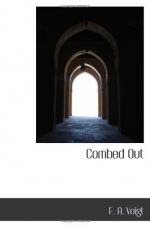I knew that the argument was hopeless. Indeed, it was no argument. It was no exchange of ideas. It was no mutual attempt at discovering truths by an impartial comparison of two different attitudes.
At times there were signs of heat on both sides. My opponent spoke of “our democratic army” (familiar phrase!) and the overbearing manner in which he connected this dictum with a number of false, irrelevant or arbitrary generalizations made me feel a momentary pang of anger and I wished he could experience a term of military service. Nevertheless, there was no actual display of bad temper or emotion and we parted with all the habitual formulae imposed by social decorum.
I knew I had come into contact with the truly representative man. His opinion and the opinions of those like him, they all made up popular opinion. All other opinion was abnormal and negligible. It was with despair that I realized the hopelessness of my own position and that of my friends.
The public did not understand the war and did not want to understand it. It was far away from them and they did not realize the amount of suffering caused by it. It also brought wealth to many who would therefore have regretted its sudden termination. This seems a hard thing to say, but nevertheless it is true. The so-called “working-classes” had developed an appetite for wealth and power that nothing could satisfy. This appetite was being fed continually, but the more it devoured the more voracious it became. Nor did the shameless profiteering of the wealthy tend to allay it in any way. Protests against the war never went beyond the passing of mere resolutions. Those who had sufficient humanity and imagination to hate the war in its entirety and to suffer from it, although not necessarily taking any part in it, were too few and too scattered and isolated to take any effective action.
The extent to which a man can suffer is the precise measure of his merit, and thus it was that our patriots and war-enthusiasts being incapable, by reason of their grossness and vulgarity, of suffering in a spiritual sense, were immune from the misery caused by the war and yet it was they above all others upon whose support the continuance of the war depended.
This was the terrible fatality. The more a man suffered from the war the smaller was his control over it.
Everywhere, those who deserved to suffer did not suffer and those who did not deserve to suffer suffered. And that was why the war went on. Most people were so indifferent that it was impossible to talk to them without anger. I could think of nothing else but the war. I could not escape from its invisible presence. The streets and houses seemed the immaterial creations of some dream, and somewhere behind them the slaughter was going on, and amid the noise of the traffic the throbbing of the bombardment was plainly audible.
Sometimes I felt an impulse to shout from the house-tops like a Hebrew prophet and denounce this most wicked of generations. But the very futility of the idea filled me with mortification.




